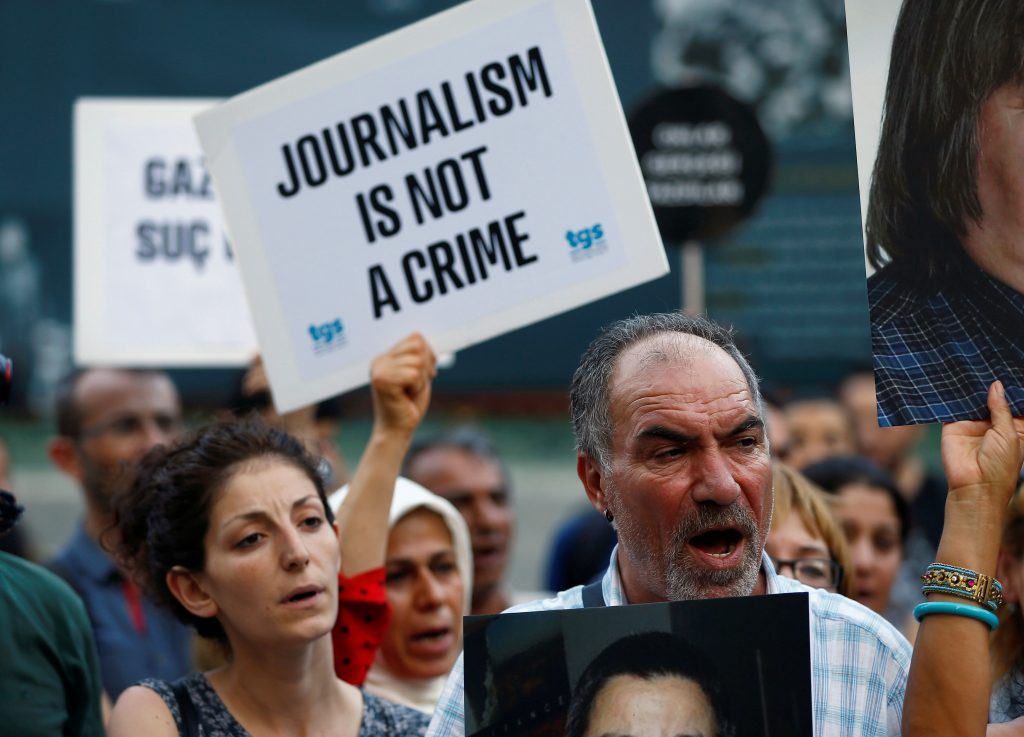Hundreds of journalists remain behind bars for reporting the truth in several countries around the Arab World, while the region as a whole remains a dangerous place to be involved in the media.
Countries in the Arab region are some of the world’s worst offenders when it comes to jailing reporters, according to the latest figures from Reporters Without Borders (RSF).
Egypt, which ranks at 166 in RSF’s World Press Freedom Index, Saudi Arabia (170) and Syria (173) are rated particularly badly, with, collectively, more than 70 journalists imprisoned over the past year – largely for reporting contrary to government narratives.
Morocco, Algeria and Libya continue to be marked red or black on the World Press Freedom map because their situation is ranked as ‘bad’ or ‘very bad’.
Tunisia, Mauritania and Qatar, however, are among the less repressive states in the region.
RSF, a non-profit and non-governmental organisation that aims to safeguard the right to freedom of information, stated that in some Arab countries, news organisations are closely monitored using sophisticated hacking and espionage methods. This leaves almost no room for press freedom.
Those who choose to report unauthorised information often end up imprisoned, deported, or dead.
With the Covid-19 pandemic sweeping the region, several governments have further tightened restrictions on the media to control opposition and sway public opinions.
“[This is] the worst year on record for journalists behind bars in retaliation for their work. … We’ve seen a backlash around the world against journalists reporting on the pandemic itself as well as government responses to the pandemic,” Courtney Radsch, Advocacy Director for the Committee to Protect Journalists, said to USNews.
RSF’s reports only include journalists that were killed or imprisoned in connection with their journalistic work, the organisation says. The numbers do not include those who were imprisoned for reasons unrelated to – or yet to be connected to – their work.
Tightened grip over the media
In the Arab world, Saudi Arabia imprisons the most journalists, with around 32 recently put behind bars for reporting news that the government seemed to dislike, according to RSF.
In recent years, Saudi authorities have imposed tough restrictions on reporters and activists, reflecting a broader degradation of press freedom in the country. Journalists are kept under close surveillance, according to human rights organisations, even when they are abroad – as illustrated by Jamal Khashoggi’s murder in Istanbul in October 2018.
“Despite his talk of reform, Mohammad bin Salman has intensified the repression since his appointment as crown prince in June 2017. The number of journalists and citizen-journalists in detention has tripled since the start of 2017. Most are being held arbitrarily and are likely subjected to torture, which is almost systematic for prisoners of conscience,” RSF states.
Egypt follows shortly after Saudi Arabia, with around 31 journalists recently imprisoned, according to the latest RSF statistics. Since Abdelfattah el-Sisi took the presidency in 2014, Egypt has seen a spike in journalist arrests, with allegations of spreading fake news used to justify persecution.
Under the pandemic, press freedom has become more and more alarming in the country, with frequent raids and arrests. On top of this, journalists often spend years in detention with no charge – at least eight journalists have been affected by this practice since April 2019.
Syria follows closely, with 17 journalists reportedly imprisoned in what RSF calls an ‘unbearable environment’ for the media. Reporting in the country is highly risky, with high chances of arrest, abduction, and even death. According to reports, at least ten journalists were killed in 2018, of whom ‘three were the victims of murders in unclear circumstances that were never solved.’
“The slightest hint of criticism, or any reference to cases of infection or corruption and poverty can earn even the most loyal of journalists a summons by the intelligence services or an indefinite prison term,” RSF reported in its 2020 RSF Index: The illusion of peace in the Middle East.
Less repressive Arab nations
Some countries, however, are doing tentatively better on the 2021 World Press Freedom Index compared to the rest of the Arab region.
In Tunisia (73 on the index), for example, greater press freedom remains one of the most prominent achievements of the country’s 2011 revolution. A drastic change has been seen since the removal of President Zine al-Abidine Ben Ali during the Arab Spring. Press rights remain vulnerable, however, and the country has dropped a place on the index since 2020.
Mauritania (94) has also been praised for its reforms to allow journalists to report more freely in the country. The state’s ranking has jumped three countries since 2020, one year after Mohamed Ould El-Ghazaouani took the presidency and appointed a national commission for press reform. More reforms are promised.
“Undertaking to implement its 64 recommendations, the president referred to the consolidation of freedom of expression as a ‘strategic choice for the state,'” RSF reported.
Qatar (128) has been praised for taking steps to improve press freedom ahead of the FIFA 2022 World Cup. According to 2021 reports, the country currently has no journalists imprisoned, and has progressed one step from its 129 ranking in 2020.
RSF notes that Qatar’s state-owned Al Jazeera media company has transformed the press landscape in the Arab world, especially for its coverage of MENA politics during the Arab Spring.
Though there’s more to be done, Qatar does seem to be taking positive steps towards greater press freedom.
Follow Doha News on Twitter, Instagram, Facebook and Youtube







